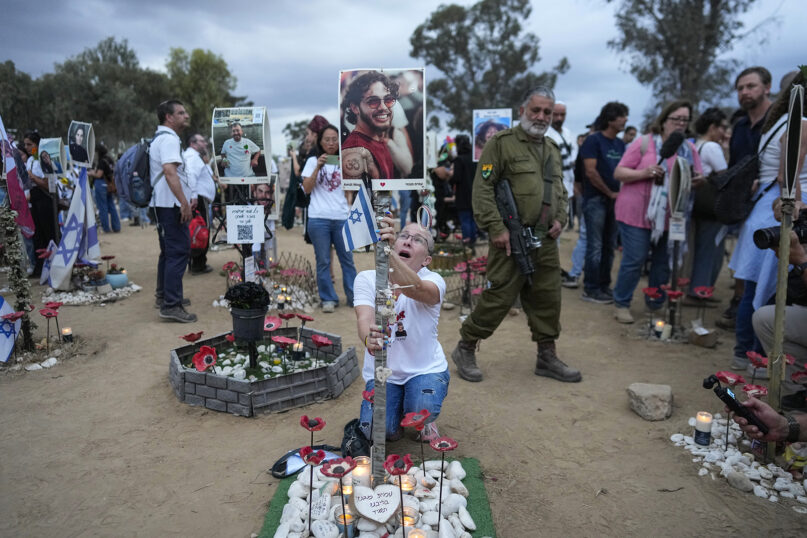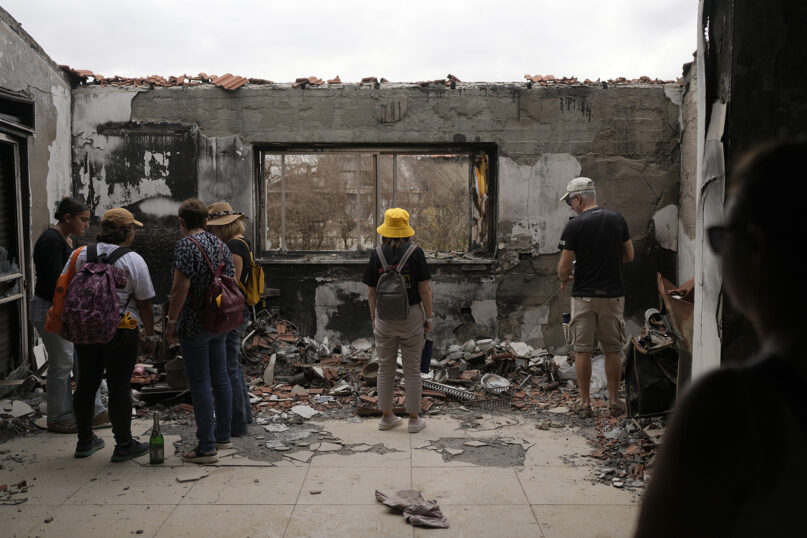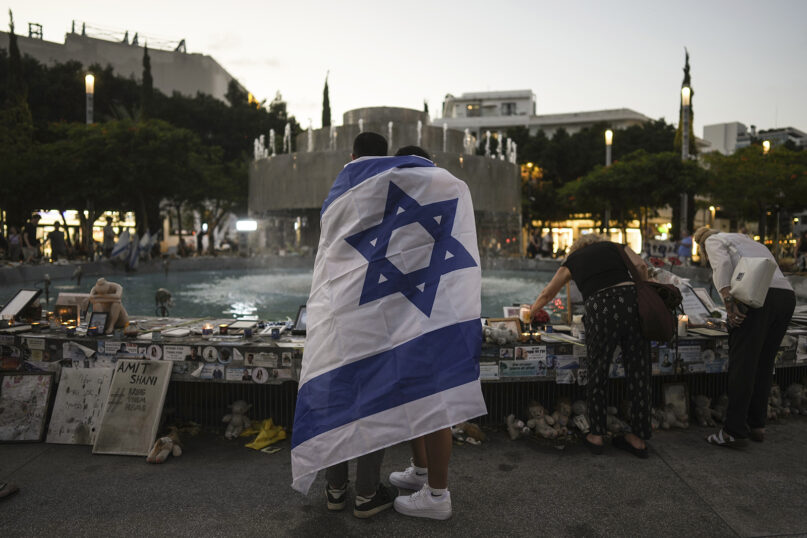JERUSALEM (RNS) — Israelis observed the first anniversary of the Oct. 7 Hamas massacre with somber ceremonies for the victims, prayers for the welfare of the country’s 101 remaining hostages and safety for soldiers at a time when the country is fighting battles on several fronts.
Families of the hostages still held in Gaza stood vigil in front of the prime minister’s residence. They blame Netanyahu for failing to win their loved ones’ release.
Memorial services were also held at Gaza border farms and towns infiltrated by Hamas. At the site of the Nova music festival where 370 concert-goers were killed, families and friends gathered around the photos of the victims placed, along with Israeli flags and teddy bears, around the large field.
The grassroots decision to mark the anniversary according to the secular calendar rather than the Jewish calendar enabled religious and secular Jews, as well as people of other faiths, to mourn together. On the Jewish calendar, the massacre occurred on the holiday of Simchat Torah, when Orthodox Jews cannot travel.
Vigils were also held outside of Israel. In a church in northeastern Thailand, the Sriaoun family gathered on Sunday to pray for the safe return of their oldest son, Watchara Sriaoun, 32, one of six Thais believed to be held captive by Hamas since the war began, according to Reuters. Hamas killed or abducted dozens of migrant workers who were employed as construction workers, farm workers or caregivers.
The International Christian Embassy Jerusalem, an Israel-based evangelical ministry, held an online international prayer gathering. Cardinal Pierbattista Pizzaballa the Latin Patriarch of Jerusalem, called on Catholics to observe a day of fasting, penance and prayer for Middle East peace.

People visit the site of the Nova music festival, where hundreds of revelers were killed and abducted by Hamas and taken into Gaza, on the one-year anniversary of the attack, near Kibbutz Reim, southern Israel, Monday, Oct. 7, 2024. (AP Photo/Ohad Zwigenberg)
Gaza’s tiny Palestinian Christian community has been decimated by the war between Israel and Hamas. More than 20 Christians have been killed by Israeli airstrikes, church officials say, and hundreds have emigrated.
For Palestinians living in Gaza, the vast majority of them Muslims, there has been no reprieve from the war, which has killed 41,000 people (the Israeli government has said that approximately 17,000 of these were armed terrorists) and flattened the Gaza Strip, leaving most of the population living in tents.
A year ago, Adele Raemer was in her home on Kibbutz Nirim, a Gaza border community, when Hamas terrorists infiltrated Israel and the farms and towns closest to the border. Of the roughly 1,200 Israelis and foreign nationals killed that day, five were from Nirim. Five additional members were among the 250 hostages hauled into Gaza. Three were later executed.
On Monday, Raemer started her day in the southern city Beersheva, where she and other Nirim members displaced by the war have taken refuge.
Like many Israelis around the country, at 6:29 a.m. — the moment, a year ago, that Hamas launched its attack — Raemer observed a moment of silence in honor of the victims. Then she created a short video, one of the many she has produced over the years about her life on the Israeli side of the Gaza border.

People visit a battle-scarred home at Kibbutz Be’eri, an Israeli communal farm on the Gaza border, as Israel marks the one-year anniversary of the Hamas attack on Israel on Monday, Oct. 7, 2024. (AP Photo/Ohad Zwigenberg)
Although the assault was a horrifying life-changing event, Raemer said, she and other Nirim residents are determined to move home and lead their best lives.
“I am here to tell the world that we are strong. We will rebuild, we will go back to live in Nirim. We will build bigger and stronger and safer than before, and that will be my revenge. To go back home and to live well and to thrive. Am Yisrael Chai” — the Jewish People Live — “whether our enemies like it or not,” Raemer said.
Initially, the Oct. 7 attack shook Joanna Chen’s sense of personal safety. But it also clarified her priorities.
Chen, a writer and literary translator who volunteers once or twice a week with the Israeli NGO Road to Recovery to transport Palestinian children in need of medical care to Israel hospitals, took three weeks off “to digest” what had happened.
The morning of Oct. 7 she heard an air raid siren and then booms that shook her house. She thought there had been an earthquake. Soon she learned that other volunteers from Road to Recovery had been kidnapped or murdered. “My family was very unhappy at the thought of me continuing. I was very frightened for people on both sides.” But after considering the needs of the Palestinian children, she decided to resume her volunteer work.

People visit a memorial for victims of the bloody Oct. 7 cross-border attack by Hamas terrorists on the one-year anniversary of the attack, in Tel Aviv, Israel, Monday, Oct. 7, 2024. (AP Photo/Oded Balilty)
“I decided the sanctity of life is more important, and anyone who has a sick child can appreciate this,” Chen said. “These children deserve medical attention and I’m going to do it. I’ve been doing it ever since.”
As an Arab citizen of Israel, Thabet Abu Rass, a political analyst and longtime coexistence advocate, has had to work through a complicated situation.
On a national level, the massacre and ensuing war have strained relations between some Jews and Israel’s Arab citizens, he said.
“It is not only the Jewish people who have experienced trauma,” Abu Rass noted. “I am an Israeli citizen and a Palestinian by nationality. I care about my (Jewish) friends and colleagues, many of them on southern kibbutzim.”
Two weeks before the Hamas attack, Vivian Silver, a Jewish peace activist murdered at her home on the Gaza border, had asked Abu Rass to lead a tour of Israel’s unrecognized Bedouin villages.
“I am seeing the very people who built the peace movement massacred. At the same time, 24 members of my mother’s family have been killed in Gaza,” he said.
Yet when Israeli Arabs openly express sympathy for Palestinian civilians or question the IDF’s right to operate in Gaza, they are considered disloyal, especially in far-right-wing Jewish circles, Abu Rass said. Some young Arab Israeli university students have received warnings after posting such sentiments on social media, while some employees have been fired.
“Israel has a strong democracy compared to Arab countries, but this lack of freedom of speech makes us angry and frustrated,” Abu Rass said.
Still, the peace activist is cautiously optimistic.
“The Arab community has the power to make change, to vote out this right-wing government,” he said. “Jews and Arabs can and will struggle together for a better future.”














